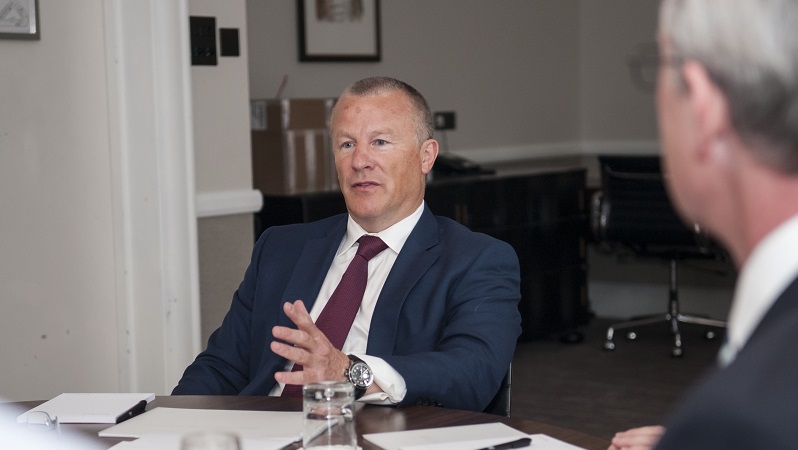Rumblings of Neil Woodford’s latest comeback to buy back a handful of his unquoted investments at a discounted price has been described as a “slap in the face” to the remaining investors in his Woodford Equity Income fund who have already stomached heavy losses.
Woodford has been dipping his toes back into fund management and gauging interest in a new investment venture that would see him move away from his retail roots and target institutional investors.
Portfolio Adviser understands Woodford and several colleagues from his fund boutique Woodford Investment Management, which closed last year, have held preliminary discussions with a handful of institutional investors and wealth managers.
Among the companies he is trying to buy back are Benevolent AI, Rutherford Cancer Centres, formerly Proton Partners, and Immunocore.
Woodford has also reportedly floated the idea of taking litigation financer Burford Capital, a company he has a lengthy history with, private though sources have called this possibility “extremely remote”.
Woodford declined to comment.
Another slap in the face to investors
Interest in a Woodford-backed venture picked up after specialist life sciences investor WG Partners failed to raise enough money to buy a portion of the illiquid companies from Woodford Equity Income.
Sky News reported that Woodford is looking to buy the 20 biotech companies for £500m, which is £50m lower than what WG had pledged to PJT Park Hill, the investment bank tasked with selling the suspended fund’s unquoted holdings. The Times reported WG valued the individual stocks at about 55% of their peak worth.
Willis Owen head of personal investing Adrian Lowcock said the fact Woodford is contemplating buying back the companies Park Hill has been unable to sell at discounted prices was “disturbing” and “another slap in the face to investors”.
“What is most disturbing is that he may be considering buying back the companies which Park Hill has been unable to sell because either there are no interested buyers, or they are not offering a reasonable price for the assets. Either way the investments are not highly valued by the market at this time.
“It would be another slap in the face to investors in the LF Equity Income fund if Woodford was able to buy the assets at vastly reduced prices, increasing their losses in the process.”
Investors who put their money in Woodford Equity Income at peak size and held the fund until suspension would have seen their original investment halve.
Investors received 75% of the fund’s current value in the first distribution payment from the liquid names in the portfolio which were sold by Blackrock.
Conviction in unquoteds
The fact Woodford is eyeing up his former biotech holdings shows he still clearly has conviction in those businesses, said AJ Bell head of active portfolios Ryan Hughes.
“It’s always a surprise, given the fall from grace,” Hughes said of the new venture, “but he has always been adamant that there was significant value in these unquoted businesses that was yet to be realised.
“Clearly for his investors, things are still very raw, and it is very soon and that is going to be difficult for them. But I presume in his mind, the valuation opportunity is too good to miss.”
But fees campaigner Robin Powell thinks Woodford’s move says more about his desire to repair his legacy.
“This looks to me like one man’s mission to make a point and to prove himself again rather than a sensible investment proposition,” said Powell.
“Woodford has just turned 60, and I’m sure he’s thinking about his professional legacy. What better way to do that, from his point of view, than by buying the very stocks that got him into trouble in the first place and seeing their fortunes improve?”
‘No one in retail would touch anything Woodford’
Lowcock said Woodford’s shift away from retail to institutional investors was understandable given his focus has increasingly been in small and unlisted stocks.
The fact the former star manager has been “exploring all avenues” to get back into fund management was not a surprise, he added. “No one would want their career to end the way his did.”
CWC Research managing director Clive Waller said Woodford seeking out institutional investors was a matter of necessity.
“Certainly no one in regulated retail would touch anything connected with Woodford,” Waller said. “Not only are his investment skills being questioned, but also his cavalier behaviour.”
Woodford stunned the industry when reports emerged before Christmas that he and business partner Craig Newman were seeking opportunities in China as investors remained trapped in Woodford Equity Income. Similarly the pair were meeting with investors interested in early-stage companies.
The Financial Conduct Authority is currently looking into the suspension of the Woodford Equity Income fund and whether the relevant parties, including the fund’s authorise corporate director Link, did enough to protect consumers.










